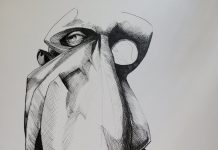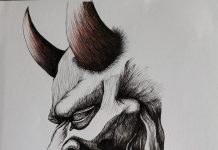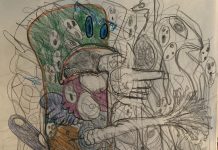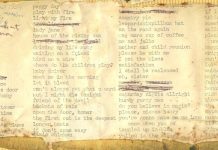They told him in March. A manila envelope full of scan results, a half-hearted handshake from the doctor, a lot of words like “advanced” and “inoperable” and “I’m so sorry.”
He didn’t say much. Just nodded, took the envelope, and went home to make coffee. He lit a joint while it brewed, stared out the window, and whispered, “okay.”
His name was Eli.
He was sixty-eight, and not particularly noble or tragic. He had two ex-wives, one estranged daughter, a bad knee, and a rusted-out Ford Ranger. He played a lot of bad jazz records, smoked too much, talked too little. He had made a habit of disappearing from people’s lives gently, without much ceremony.
But the diagnosis shifted something.
He decided to visit everyone who had ever mattered to him. Not to make amends, not to deliver grand speeches. Just to show up. Say hi. Thank you. Goodbye, maybe.
________________________________________
He started with Miriam, who had been his high school English teacher forty-nine years ago. She lived in a retirement home in western Pennsylvania, soft-spoken now, nearly blind. She didn’t remember his name until halfway through the visit. But when she did, she smiled and said, “You were the one who wrote about the dead tree.”
“Yeah,” Eli said. “I was.”
They sat together and listened to the rain. She held his hand. Neither said much more.
________________________________________
Next was Jerome, the man who used to run the record store in their college town. Eli had spent countless afternoons there in his twenties, flipping through stacks of vinyl and talking Coltrane.
Jerome lived above a laundromat now, had three cats, and still smoked clove cigarettes. He didn’t recognize Eli at first, but when he did, he laughed and said, “I thought you were dead.”
“Close,” Eli said. “Just early.”
They spent the afternoon listening to a warped copy of Mingus Ah Um and laughing about nothing. When Eli left, Jerome hugged him so tight it hurt his ribs.
________________________________________
He went to Chicago. Albuquerque. A tiny fishing town in Maine.
He visited ex-girlfriends. One of them, Maria, had four grandchildren and a parrot that said “fuck off” when the phone rang. She served him coffee and lemon bars and said, “You were too sad to love properly.”
“I know,” he said. “Thank you for trying anyway.”
She nodded. He held her hand until the parrot screamed and broke the spell.
________________________________________
Some people were gone already. He left notes on graves, scratched names into bar napkins, lit candles for people who never asked to be remembered.
Some didn’t want to see him. He understood. He sat in his truck, smoked, and drove on.
________________________________________
One afternoon in Kansas, he met a woman named Carla who used to make him pancakes after open mic nights. She opened the door and said, “Jesus. I thought you were a ghost.”
“Close enough,” he said.
She let him in. They talked for three hours about music and lost things and the way coffee used to taste better. She made him toast. When he left, she cried and didn’t know why.
________________________________________
He kept a notebook. Names, places, random thoughts. No details. Just proof he’d been there.
At a gas station in Nevada, a boy behind the counter looked up from his phone and said, “You okay, sir?”
Eli nodded.
“You look like you’re going somewhere.”
“Yeah,” Eli said. “I am.”
________________________________________
By August, he was thinner, quieter. The heat made it hard to drive. The nights dragged. The notebook was nearly full.
He stopped in a little town in Oregon where no one knew him. Rented a room above a diner. Drank tea. Watched leaves begin to turn. Wrote letters he never mailed.
One morning, just before dawn, he opened his notebook and wrote one line on a blank page:
“We’re all just passing through.”
He lit a joint and let the smoke drift out the open window, like a thought forgotten mid-sentence. Then he leaned back in the chair and closed his eyes.
________________________________________
A few days later, the waitress came upstairs to collect the rent.
“Sir?”
She stepped into the room and froze when she saw him motionless by the window. Then, backing away in silence, her hip bumped the desk. The notebook slipped and landed softly in the trash.
She covered her mouth. Stood there a moment. Then left to make the call.
The room stayed quiet.
The next morning, some men came to clean the place, take out the trash—napkins, receipts, a half-smoked joint, and a notebook full of names, places, and fragments, written for the world and an audience of one.
Outside, the wind kicked up. A paper napkin lifted off the pavement, spun once, and flew away.































